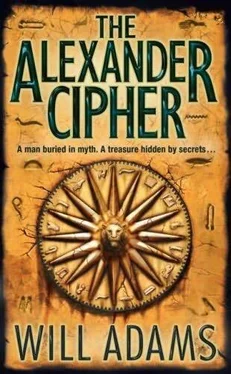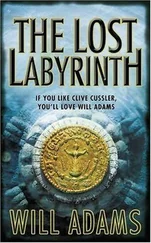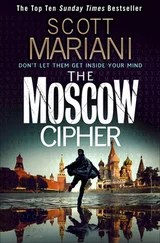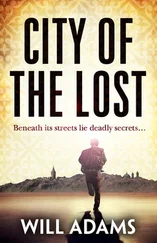Will Adams - The Alexander Cipher
Здесь есть возможность читать онлайн «Will Adams - The Alexander Cipher» — ознакомительный отрывок электронной книги совершенно бесплатно, а после прочтения отрывка купить полную версию. В некоторых случаях можно слушать аудио, скачать через торрент в формате fb2 и присутствует краткое содержание. Жанр: Прочие приключения, на английском языке. Описание произведения, (предисловие) а так же отзывы посетителей доступны на портале библиотеки ЛибКат.
- Название:The Alexander Cipher
- Автор:
- Жанр:
- Год:неизвестен
- ISBN:нет данных
- Рейтинг книги:5 / 5. Голосов: 1
-
Избранное:Добавить в избранное
- Отзывы:
-
Ваша оценка:
- 100
- 1
- 2
- 3
- 4
- 5
The Alexander Cipher: краткое содержание, описание и аннотация
Предлагаем к чтению аннотацию, описание, краткое содержание или предисловие (зависит от того, что написал сам автор книги «The Alexander Cipher»). Если вы не нашли необходимую информацию о книге — напишите в комментариях, мы постараемся отыскать её.
The Alexander Cipher — читать онлайн ознакомительный отрывок
Ниже представлен текст книги, разбитый по страницам. Система сохранения места последней прочитанной страницы, позволяет с удобством читать онлайн бесплатно книгу «The Alexander Cipher», без необходимости каждый раз заново искать на чём Вы остановились. Поставьте закладку, и сможете в любой момент перейти на страницу, на которой закончили чтение.
Интервал:
Закладка:
"Look!" said Mansoor, pointing his flashlight at the side walls. They went closer to inspect them. There was paint on the plaster, though terribly faded. It had been common practice in antiquity for important scenes from the dead person's life to be painted in or around the tomb. "You can photograph these?" asked Mansoor.
"I'm not sure how well they'll come out," said Gaille wretchedly.
"You must wash them first," said Augustin. "Lots and lots of water. The pigment may look dead now, but give them some water and they will spring back to life like beautiful flowers. Trust me."
"Not too much water," warned Mansoor. "And don't set up your lights too close. The heat will crack the plaster."
Gaille looked around desperately at Elena, who studiously refused to meet her eye. Instead, she shone her flashlight at the inscription above the portal into the main chamber. "Akylos of the thirty-three," said Augustin, translating from the Ancient Greek. Elena fumbled and dropped her flashlight at that moment, cursing violently, so Ibrahim turned his light on the inscription instead, allowing Augustin to complete his translation. "Akylos of the thirty-three. To be the best and to be honored above the rest."
"It's Homer," murmured Gaille. Everyone turned to look at her in surprise. She felt her cheeks burn. "It's from the Iliad," she said.
"That's right," nodded Augustin. "About a man called Glaucus, I believe."
"Actually, it comes up twice," said Gaille timidly. "Once about Glaucus and once about Achilles."
"Achilles, Aklyos," nodded Ibrahim. "He evidently thought a great deal of himself." He was still staring up at the inscription when he followed Mohammed into the main chamber, so that he tripped over the low step and went sprawling onto his hands and knees. Everybody laughed as he picked himself up and brushed himself down with the self-deprecating smile and shrug of the accident prone.
Augustin went to the shield pinned to the wall. "The shield of a hypastist," he said. "A shield bearer," he explained when Ibrahim frowned. "Alexander's special forces. The greatest unit of fighting men in the most successful army in the history of the world. Maybe he wasn't being so boastful after all."
Morning sunlight fell on Knox's cheek as he lay on Augustin's couch and tried to catch up on sleep. He groaned and turned his back, but it was no good. The day was already too sticky. He rose reluctantly, took a shower, ransacked Augustin's room for clothes, then ground some beans and set the coffeemaker brewing. He slathered a croissant with butter and confiture de framboises, then wolfed it down as he wandered the apartment looking for ways to divert himself. Egyptian TV was gruesome at the best of times, but Augustin's flickering black-and-white portable made it completely unwatchable. And there was nothing to read except tattered newspapers and some comic books. This was not an apartment for killing time in. It was an apartment for sleeping in, and preferably not alone.
He walked out onto the balcony. Identical high-rises on every side, all in the same disheartened beige, washing hung out to dry on the balconies, ubiquitous gray dishes all turning to their satellites like the faithful to Mecca. Yet still he felt glad to be here. Few Egyptologists would say it openly, but they looked down their noses at Alexandria. They barely considered the Greco-Roman era to be Egyptian at all. But Knox didn't think that way. To him, this was Egypt's golden age, and Alexandria its golden city. Two thousand years ago, it had been the greatest metropolis on earth, nurturing the finest minds of antiquity. Archimedes had studied here; so had Galen and Origen. The Septuagint had been translated here. Euclid had published his famous works here. Chemistry took its very name from here; al-Khemia was the black land of Egypt, and alchemy the Egyptian art. Aristarchus had proposed the heliocentric theory here, well over a millennium before it was rediscovered by Copernicus. Eratosthenes had calculated almost exactly the circumference of the earth by extrapolating from discrepancies in the lengths of shadows cast at the sun's zenith both here and in Aswan, some 850 kilometers to the south, on the summer solstice. What imagination! What intellectual curiosity and endeavor! An unprecedented collision of cultures, an effervescence of thought the equal of Athens and unmatched again until the Renaissance. It was beyond him how anyone could dismiss such achievements as second best or think that-
His meditations were interrupted suddenly by a noise from inside, as though someone was trying surreptitiously to clear his throat. Had his sanctuary been discovered already? He stepped to the edge of the balcony, so that he couldn't be seen through the glass doors, and pressed himself flat against the wall
Ibrahim followed close behind Mohammed as he led them down the corridor into the main body of the necropolis. For all that he'd been dampening his hopes before visiting this place, he still felt a sense of anticlimax that the tomb had proved to be for a common soldier, not a king. But he was a professional, and he concentrated hard, the better to understand what he was dealing with.
They came to a chamber, its walls cut with columns of loculi, like the drawers of a massive morgue. It seemed to confirm his theory that this whole complex had started off as a private Macedonian tomb for Akylos before being expanded into a public necropolis. He took a closer look. The niches were crowded with bones, half buried in dark sandy dirt, others scooped out onto the floor by grave robbers looking for treasure. Amid the debris they found a broken faience figure, some green and blackened coins dating from the first to fourth centuries AD, numerous fragments of terra-cotta from funerary lamps, jars, and statuettes. There were chunks of stone and plaster, too. Loculi had typically been sealed after burials, but the looters had smashed these seals to get at the contents.
"Will you find mummies, do you think?" asked Mohammed. "I took my daughter to your museum once; she became fascinated by the mummies."
"It's very unlikely," answered Ibrahim. "The climate here isn't kind; it eats away everything but bone. And even if they had survived the humidity, they'd never have survived the tomb robbers."
"Robbers stole mummies?" frowned Mohammed. "What for?"
"People often hid jewelry and other valuables in their body cavities, so the robbers would take them up into the sunlight to tear them apart and search them. But the mummies themselves had real value, too. Particularly in Europe."
"You mean museums?"
"Not at first, no," said Ibrahim. "You see, about six hundred years ago, Europeans came to believe that bitumen was very good for the health. It was the wonder cure of its time. Every apothecary had to stock it. Demand was so great that supplies ran short and traders started looking for new sources. You know how black mummified remains can get? People became convinced they'd been soaked in bitumen. That was where the word 'mummy' came from, you know; 'mumia' was Persian for 'bitumen,' and most of the original supplies of bitumen came from Persia, because it forms naturally there, in great congealed pools."
Mohammed grimaced. "People used mummies as medicine?"
"Europeans did, yes," said Ibrahim, giving the big builder a grin. "But, anyway, Alexandria was right at the center of this trade, which is one reason we've never found even fragments of mummy here, though we know for sure that mummification was practiced."
They moved on to another chamber. Mansoor lit up a plaster seal with his flashlight. It had faint traces of paint on it, a scene of a seated woman and a standing man clasping right hands.
"The wife has died," Ibrahim explained to Mohammed. "This painting is known as a dexiosis, a kind of farewell, with them saying good-bye for the last time."
Читать дальшеИнтервал:
Закладка:
Похожие книги на «The Alexander Cipher»
Представляем Вашему вниманию похожие книги на «The Alexander Cipher» списком для выбора. Мы отобрали схожую по названию и смыслу литературу в надежде предоставить читателям больше вариантов отыскать новые, интересные, ещё непрочитанные произведения.
Обсуждение, отзывы о книге «The Alexander Cipher» и просто собственные мнения читателей. Оставьте ваши комментарии, напишите, что Вы думаете о произведении, его смысле или главных героях. Укажите что конкретно понравилось, а что нет, и почему Вы так считаете.












